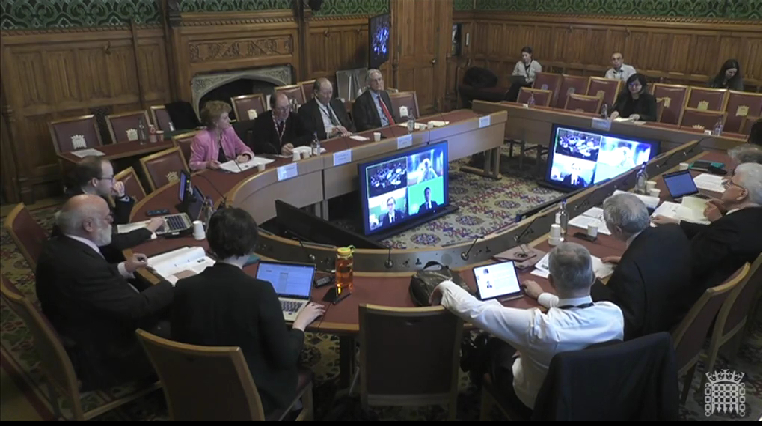
Second evidence session. Click to watch video
This article was originally published on Drone Wars.
Author: Peter Burt
The second public session of the House of Lords inquiry into artificial intelligence (AI) in weapon systems took place at the end of March. The session examined how the development and deployment of autonomous weapons might impact upon the UK’s foreign policy and its position on the global stage and heard evidence from Yasmin Afina, Research Associate at Chatham House, Vincent Boulanin, Director of Governance of Artificial Intelligence at the Stockholm International Peace Research Institute, and Charles Ovink, Political Affairs Officer at United Nations Office for Disarmament.
Among the wide range of issues covered in the two-hour session was the question of who could be held accountable if human rights abuses were committed by a weapon system acting autonomously. A revealing exchange took place between Lord Houghton, a former Chief of Defence Staff (the most senior officer of the UK’s armed forces), and Charles Ovink. Houghton asked whether it might be possible for an autonomous weapon system to comply with the laws of war under certain circumstances (at 11.11 in the video of the session):
“If that fully autonomous system has been tested and approved in such a way that it doesn’t rely on a black box technology, that constant evaluation has proved that the risk of it non-complying with the parameters of international humanitarian law are accepted, that then there is a delegation effectively from a human to a machine, why is that not then compliant, or why would you say that that should be prohibited?”
This is, of course, a highly loaded question that assumes that a variety of improbable circumstances would apply, and then presents a best-case scenario as the norm. Ovink carefully pointed out that any decision on whether such a system should be prohibited would be for United Nations member states to decide, but that the question posed ‘a big if’, and it was not clear what kind of test environment could mimic a real-life warzone with civilians present and guarantee that the laws of war would be followed. Even if this was the case, there would still need to be a human accountable for any civilian deaths that might occur.
In response, Houghton stated:
“There still is human accountability because a human, ultimately a politician, a government minister, has delegated through a targeting directive the fact that he is content to delegate to this particular piece of autonomous machinery in certain circumstances that it can act on its own predetermined algorithms or whatever so long as they’re not a black box that no-one can understand.”
Ovink: “In that case then the person making that decision would be legally responsible for the consequence of decisions.”
Houghton: “Absolutely. As government ministers are all the time about the authorisation of lethal force. It’s one of their duties.”
This will come as surprising news to the families of those who have sought to obtain redress from the British government following the deaths of their loved ones in UK military action. It is laughable to suggest that any Minister of the Crown might end up in the dock facing a charge that they were responsible for unlawful civilian deaths. Although former Ministers have been prosecuted for their individual dishonesty, no minister has ever been successfully prosecuted for the consequences of a decision in relation to military action at least since World War II and probably at any time in history. A citizen effort to bring former Prime Minister Tony Blair to justice for his role in the illegal 2003 Iraq War was summarily rejected by the High Court.
Even efforts aimed at seeking justice for the actions of ordinary service personnel, let alone Ministers, have zero chance of success. An investigation by the International Criminal Court (ICC) concluded “it is without dispute there is evidence war crimes were committed” during by British soldiers during the invasion and occupation of Iraq. The ICC was unable to decide whether the government had colluded to prevent soldiers from prosecution, although detectives involved in investigating the crimes told the BBC that the Ministry of Defence had covered up the murder of Iraqi civilians. Far from ensuring a robust system of accountability extending to the highest levels of government, the ICC found that “several levels of institutional civilian supervisory and military command failures contributed to the commission of crimes against detainees by UK soldiers in Iraq.” Since then the government has introduced the Overseas Operations (Service Personnel and Veterans) Act which creates further barriers against the prosecution of British military personnel for alleged offences committed in the course of duty outside the UK, helping to place their actions above the law.
Before anyone can be held accountable for a war crime there has to be evidence that a crime has even taken place. An important part of gathering such evidence is the damage and casualty assessments conducted by the military themselves following an attack. Unlike other NATO nations, the UK clearly does not undertake proper and accurate assessments of deaths resulting from the actions of its armed forces. The government, for example, claims that only one civilian has died in drone attacks and other air strikes carried out by the Royal Air Force (RAF) during the war against Islamic State in Iraq and Syria, even though senior military officers have admitted that this is simply not credible.
Painstaking analysis of the UK’s military strikes against ISIS undertaken by Airwars has shown that a number of RAF air strikes had resulted in civilian deaths, but the Ministry of Defence flatly rejected requests to review the evidence and has refused to review its policies on battle damage assessments.
It seems that the British government and the Ministry of Defence will do everything in their power to ensure that the military are not seen as being responsible for war crimes or human rights abuses. It is not alone among nations in this respect, of course. However, given the difficulties in holding current militaries to account when there are clear lines of responsibility, what are the chances of holding anyone to account when the killing is undertaken by an autonomous machine?
